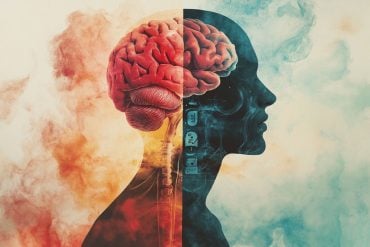Summary: Extracting nanosized exosomes from bone marrow stem cells and injecting them into mice, researchers reverse symptoms of multiple sclerosis.
Source: UC Irvine
A nanotechnology treatment derived from bone marrow stem cells has reversed multiple sclerosis symptoms in mice and could eventually be used to help humans, according to a new study led by University of California, Irvine researchers.
“Until now, stem cell therapies for autoimmune and neurodegenerative diseases have produced mixed results in clinical trials, partly because we don’t know how the treatments work,” said corresponding author Weian Zhao, an associate professor of pharmaceutical sciences and biomedical engineering who is affiliated with the Sue & Bill Gross Stem Cell Research Center. “This study helps unravel that mystery and paves the way for testing with human patients.”
In past experiments, intravenously injected stem cells – taken from bone marrow and activated with interferon gamma, an immune system protein – often got trapped in filter organs before reaching their target. For this study, published in the journal ACS Nano, researchers avoided that problem by extracting nano-sized particles called exosomes from the stem cells and injecting them into rodents with MS.
Loaded with anti-inflammatory and neuroprotective RNA and protein molecules, the exosomes were able to slip through the blood-spinal cord barrier. In addition to rejuvenating lost motor skills and decreasing nerve damage caused by MS, they normalized the subjects’ immune systems, something conventional drugs can’t do, said study co-lead author Reza Mohammadi, a UCI doctoral candidate in materials science & engineering.
More experiments are in the pipeline.

“This novel treatment will be tested on humans in early 2020, initially on people with Type 1 diabetes,” said co-lead author Milad Riazifar, who worked on the study as a pharmacological sciences doctoral student in Zhao’s lab and is currently helping prepare for a City of Hope clinical trial of the method. “If successful, it could pave the way for treating other autoimmune diseases, including multiple sclerosis.”
Other UCI researchers involved were Egest J. Pone, Aude I. Segaliny, Laura L. McIntyre, Ashley Hamamoto, Erika N. Calle, Wenbin Liao, Victor Pham, Jayapriya Jayaraman, Jonathan R.T. Lakey and Craig M. Walsh.
Funding: Support was provided by the National Institutes of Health, a National Institute of Neurological Disorders and Stroke training grant, an Otto W. Shaler Scholarship and France’s ARC Foundation for Cancer Research.
Thanks to Peter Zekert of the UC Irvine for submitting this news for inclusion.
Source:
UC Irvine
Media Contacts:
Weian Zhao – UC Irvine
Image Source:
The image is in the public domain.
Original Research: Open access
“Stem Cell-Derived Exosomes as Nanotherapeutics for Autoimmune and Neurodegenerative Disorders”. Milad Riazifar,
M. Rezaa Mohammadi, Egest J. Pone, Ashish Yeri, Cecilia Lässer, Aude I. Segaliny, Laura L. McIntyre, Ganesh Vilas Shelke, Elizabeth Hutchins, Ashley Hamamoto, Erika N. Calle, Rossella Crescitelli, Wenbin Liao, Victor Pham, Yanan Yin, Jayapriya Jayaraman, Jonathan R. T. Lakey, Craig M. Walsh, Kendall Van Keuren-Jensen, Jan Lotvall, Weian Zhao.
ACS Nano. doi:10.1021/acsnano.9b01004
Abstract
Stem Cell-Derived Exosomes as Nanotherapeutics for Autoimmune and Neurodegenerative Disorders
To dissect therapeutic mechanisms of transplanted stem cells and develop exosome-based nanotherapeutics in treating autoimmune and neurodegenerative diseases, we assessed the effect of exosomes secreted from human mesenchymal stem cells (MSCs) in treating multiple sclerosis using an experimental autoimmune encephalomyelitis (EAE) mouse model. We found that intravenous administration of exosomes produced by MSCs stimulated by IFNγ (IFNγ-Exo) (i) reduced the mean clinical score of EAE mice compared to PBS control, (ii) reduced demyelination, (iii) decreased neuroinflammation, and (iv) upregulated the number of CD4+CD25+FOXP3+ regulatory T cells (Tregs) within the spinal cords of EAE mice. Co-culture of IFNγ-Exo with activated peripheral blood mononuclear cells (PBMCs) cells in vitro reduced PBMC proliferation and levels of pro-inflammatory Th1 and Th17 cytokines including IL-6, IL-12p70, IL-17AF, and IL-22 yet increased levels of immunosuppressive cytokine indoleamine 2,3-dioxygenase. IFNγ-Exo could also induce Tregs in vitro in a murine splenocyte culture, likely mediated by a third-party accessory cell type. Further, IFNγ-Exo characterization by deep RNA sequencing suggested that IFNγ-Exo contains anti-inflammatory RNAs, where their inactivation partially hindered the exosomes potential to induce Tregs. Furthermore, we found that IFNγ-Exo harbors multiple anti-inflammatory and neuroprotective proteins. These results not only shed light on stem cell therapeutic mechanisms but also provide evidence that MSC-derived exosomes can potentially serve as cell-free therapies in creating a tolerogenic immune response to treat autoimmune and central nervous system disorders.






